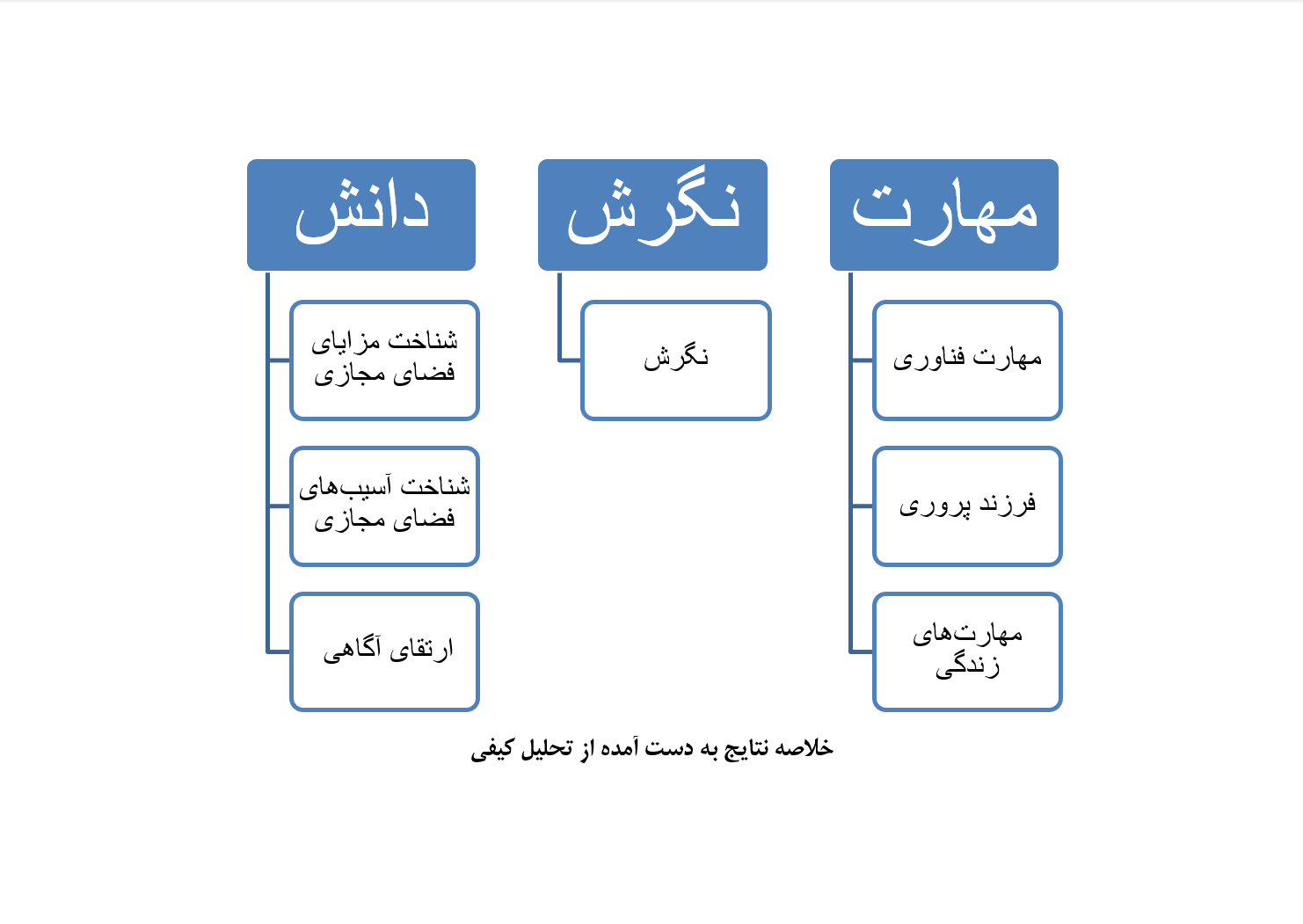ارائه الگوی جامع محتوای آموزش والدین برای پیشگیری از آسیبهای فضای مجازی در دانشآموزان
کلمات کلیدی:
آموزش والدین, پیشگیری, آسیب, فضای مجازیچکیده
امروزه عصر جدید، عصر فضای مجازی نامیده میشود که صاحب نظران آن را دولبه نام نهادهاند. از طرفی تأثیرات شگرف فضای مجازی بر تمام حوزههای زندگی اجتماعی انکارناپذیر است و از طرفی نیز آسیبها و تهدیدهای آن نیز مورد توجه صاحبنظران قرار گرفته است. هدف پژوهش حاضر ارائه الگوی محتوایی آموزش والدین برای پیشگیری از آسیبهای فضای مجازی در اختیار دانشآموزان است. روش این پژوهش کیفی و از نظر هدف کاربردی بود. جامعه آماری این پژوهش متخصصین حوزه فضای مجازی بودند که نمونه شامل 11 نفر از خبرگان در حوزه فضای مجازی به شیوه اشباع نظری و از طرح نمونهگیری در دسترس استفاده شد. روش گردآوری دادهها در این پژوهش مطالعه پیشینه، مصاحبه نیمهساختاریافته با خبرگان و صاحبنظران بوده است. برای اعتبار یافتهها از دیدگاه خبرگان و پایای نیز از ضریب توافق بین کدگذاران استفاده شد. برای تجزیه و تحلیل یافتهها نیز از روش کدگذاری استفاده شد. یافتهها نشان داد که محتوای آموزش والدین جهت پیشگیری از آسیبهای فضای مجازی بایستی شامل سه مؤلفه دانش(مزایای فضای مجازی، شناخت آسیبهای فضای مجازی و ارتقای آگاهی والدین)، نگرش و مهارت (مهارت فناوری، فرزندپروری و مهارتهای زندگی) باشد. میتوان نتیجه گرفت والدین با توسعه دانش، مهارت و نگرش خود نسبت به فضای مجازی میتوانند تا حدی از آسیبهای فضای مجازی برای فرزندان خود بکاهند.
دانلودها
مراجع
Jahantighi F. Investigating the effects and social harms of cyberspace on children. Journal of Psychosociological
Research in Family and Culture. 2023;1(1):18-22.
Egami S, Nishimura S, Fukuda K, editors. A framework for constructing and augmenting knowledge graphs using
virtual space: Towards analysis of daily activities. 2021 IEEE 33rd international conference on tools with artificial intelligence
(ICTAI); 2021.
Walker S, Hei C, Cheng B, Rattenni A, Reynolds C, Lapham S, editors. Parent and educator perspectives on the
benefits of an online space to promote offline program collaborative learning2019.
Khalkhali M, Niaz Azari K, Enayati T. Identifying Moral Damages Caused by the Lifestyle of Students Affected by
Cyberspace. International Journal of Ethics and Society. 2023;5(2):49-57.
Vigo-Arrazola B, Dieste-Gracia B. Building virtual interaction spaces between family and school. Ethnography and
Education. 2019;14(2):206-22.
Shahmohammadi G. Strategies for situational prevention of cyberspace damage. Naja Scientific Journal of Strategic
Studies. 2015;1(2):101-44.
Zandkarimi G, dehdast K, Karbalaee Shalbaf Z. Codification and Validation of Adolescents Parenting Program in
Cyberspace. Counseling Culture and Psychotherapy. 2022;13(51):1-30.
Taghizadegan M. Child and cyberspace: Analysis of parental mediation in children's use of the Internet. Cultural
Studies & Communication. 2023;19(72):201-28.
Asadi N. Investigating the ways of parental intervention in children's use of media. Rasaneh. 2020;31(3):83-110.
Cho-Hee BC, editor How to Keep Your Child Safe in Cyberspace and When He or She Stays at Home Due To.
Webinar on Social Sciences Issues Social Media; 2021.
Trumello C, Vismara L, Sechi C, Ricciardi P, Marino V, Babore A. Internet Addiction: The Role of Parental Care and
Mental Health in Adolescence. International Journal of Environmental Research and Public Health. 2021;18(12):12876.
Fleury I, Dowdy E. Social Media Monitoring of Students for Harm and Threat Prevention: Ethical Considerations for
School Psychologists. Contemporary School Psychology. 2020:1-10.
Wang S, Wang W, Guan S, Guan N, editors. Research on cyberspace security education for teenagers based on data
analysis. Proceedings of the 2nd International Conference on Information Technologies and Electrical Engineering; 2019.
Hamedi F, Motallebi N. Examining the Cultural and Social Issues of Teachers and Parents about Virtual Education,
as well as Innovative Solutions. NeuroQuantology. 2022;20(11):9443.
Seyhan AA, Carini C. Are innovation and new technologies in precision medicine paving a new era in patients centric
care? Journal of translational medicine. 2019;17(1):114.

دانلود
چاپ شده
ارسال
بازنگری
پذیرش
شماره
نوع مقاله
مجوز
حق نشر 2024 نشریه پژوهش و نوآوری در تربیت و توسعه

این پروژه تحت مجوز بین المللی Creative Commons Attribution-NonCommercial 4.0 می باشد.










